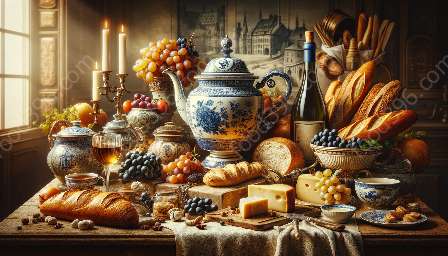French cuisine has a rich and diverse history that has greatly influenced the culinary world. From the early foundations of traditional French cooking to the emergence of haute cuisine, the evolution of this renowned culinary style is a fascinating journey that intertwines with cultural, historical, and gastronomic influences.
The Early Foundations: French Cuisine History
The roots of French haute cuisine can be traced back to the medieval period, where the culinary traditions of the various regions of France began to take shape. The use of fresh, local ingredients and a focus on elaborate feasts and banquets were characteristic of this early culinary culture.
As the French royal court and aristocracy became more influential, the refinement and sophistication of French cuisine began to evolve. The development of sauces, the introduction of new cooking techniques, and the establishment of culinary guilds all contributed to the gradual elevation of French cooking.
The Rise of Haute Cuisine
The true emergence of French haute cuisine can be credited to several influential figures and pivotal historical events. During the Renaissance, Italian chefs brought new ingredients, flavors, and techniques to France, further enriching the French culinary landscape.
However, it was not until the 17th and 18th centuries that haute cuisine truly began to flourish. The contributions of renowned chefs such as François Pierre de la Varenne and Marie-Antoine Carême played a crucial role in shaping the foundations of modern French gastronomy.
In addition to these culinary pioneers, the French Revolution and the subsequent rise of Napoleon Bonaparte also had a significant impact on the development of haute cuisine. The abolishment of the guild system and the opening of restaurants to the public led to a democratization of dining, allowing innovative chefs to showcase their skills to a wider audience.
Influence of Cultural and Historical Factors
The development of French haute cuisine was profoundly influenced by cultural and historical factors. The exchange of culinary knowledge through trade, exploration, and colonization brought new ingredients and cooking techniques to France, enriching the country's gastronomic repertoire.
Furthermore, the close association between food and French identity led to the elevation of culinary arts as a symbol of national pride. The development of regional specialties, the establishment of culinary academies, and the publication of influential cookbooks all contributed to the preservation and perpetuation of French culinary traditions.
The Legacy of French Haute Cuisine
The legacy of French haute cuisine extends far beyond its historical evolution. From the formalized structure of a traditional French kitchen, with its brigade system and meticulous attention to detail, to the enduring influence of classic French dishes and cooking techniques, the impact of haute cuisine on the global culinary landscape is undeniable.
Moreover, the philosophy of haute cuisine, with its emphasis on precision, balance, and artistic presentation, continues to inspire chefs and food enthusiasts around the world. The enduring legacy of French haute cuisine serves as a testament to the enduring impact of culinary innovation and cultural exchange.

